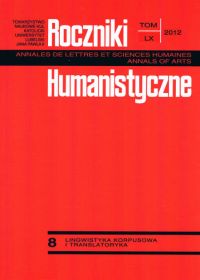Discovering patterns and meanings. Corpus perspectives on phraseology in legal discourse
Abstract
This article attempts to demonstrate different perspectives on investigating legal terminology by focusing on various types of textual recurrence. It discusses the results of a corpus-based and corpus-driven analysis of discovery, a term central to the US trial practice and criminal proceedings. The analysis starts from investigating traditional collocational patterns, both nominal and verbal. It describes meanings resulting from the emerging co-occurrence patterns between the term and various word forms identified in its co-text. Then the paper proceeds to explore computer-generated clusters formed around discovery. Finally, this article refers to the concepts of semantic preference and semantic sequence (Hunston 2008) to show how discovery tends to be found with a range of different word forms albeit all belonging to the meaning group of’ limitation’ or ‘restriction’. The connotational value of the term is presented by providing some textual evidence of discovery found in co-texts where writers express their unfavourable evaluation towards this legal concept. By drawing on Hunston’s (2008) concept of semantic sequence, the analysis illustrates how corpus linguistics can complement more traditional approaches to terminology description. It is argued that only by combining various approaches to the study of word combinations is it possible to gain important insights into the phraseological behavior of legal terms.
References
Adamczyk-Garbowska Monika, 1988, Polskie tłumaczenia angielskiej literatury dziecięcej. Problemy krytyki przekładu, Warszawa, Ossolineum.
Dambska-Prokop Urszula (red.), 2000, Mała encyklopedia przekładoznawstwa, Częstochowa, Wydawnictwo Wyższej Szkoły Języków Obcych i Ekonomii.
Fornalczyk Anna Danuta, 2010, Translating anthroponyms as exemplified by selected works of English children’s literature in their Polish versions, Łódź-Warszawa, Wydawnictwo SWSPiZ.
Hejwowski Krzysztof, 2004, Kognitywno-komunikacyjna teoria przekładu, Warszawa, PWN.
Kochanowska Anna, 2011, La traduction des noms propres. Les noms propres dans la traduction de la littérature pour enfants, Łask, Oficyna Wydawnicza Leksem.
Shavit Zohar, 1981, « Translation of children’s literature as a function of its position in the literary polysystem », [in:] Poetics Today, 2:4, 171-179.
Skibińska Elżbieta, 2001, Traduction comme moyen de communication interculturelle. Traduction pour la jeunesse face à l’Altérité, Wrocław.
Staniów Bogumiła, 2006, "Z uśmiechem przez wszystkie granice”: recepcja wydawnicza przekładów polskiej książki dla dzieci i młodzieży w latach 1945-1989, Wrocław, Wydawnictwo Uniwersytetu Wrocławskiego.
Teodorowicz-Hellman Ewa, 2004, Polsko-szwedzkie kontakty literackie: studia o literaturze dla dzieci i młodzieży, Warszawa, Instytut Badań Literackich Polskiej Akademii Nauk. Instytut Badań Literackich.
Copyright (c) 2012 Roczniki Humanistyczne

This work is licensed under a Creative Commons Attribution-NonCommercial-NoDerivatives 4.0 International License.





